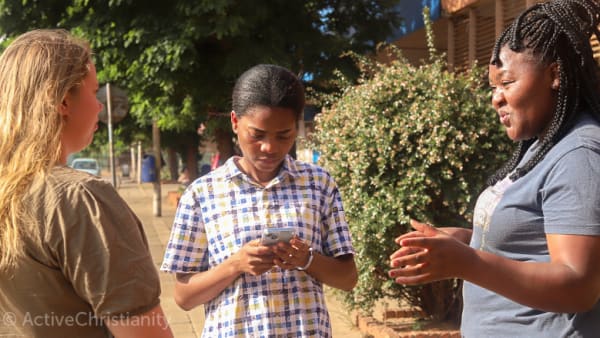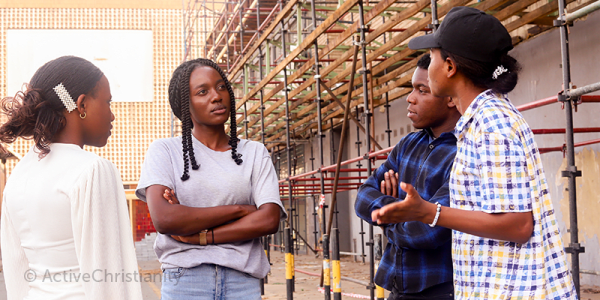Relationships are not always easy. People are very different from each other. The way one person thinks can be completely different from how another person thinks. People also tend to communicate in many different ways.
God created each of us with certain gifts and skills, and we can be thankful for each one with their different strengths. Each one of us also has areas in our nature where we are naturally weaker, areas where we can develop. As a result, there are many things we can learn from one another throughout life.
Lesson #1: I need to focus on the areas where I myself need to change
One lesson that will help me to have good relationships is that I need to have my own connection with God in life, and focus on what God wants me to do in the different situations instead of on what other people are doing. Most people know the verses in Matthew 7:1-2 (NIRV): “Do not judge others. Then you will not be judged. You will be judged in the same way you judge others. You will be measured in the same way you measure others.” So the question for me is how should I do this in my own, everyday life?
I know that the way I see things is not always how somebody else might see the same situation. And even when communication is good, it is still possible to misunderstand or judge wrongly. So when Jesus gave us that commandment, it wasn’t just because judging others in my thoughts leads to all kinds of evil, like criticising, suspicions and gossiping. It was also because my own judgment is not always true and perfectly righteous.
“Why do you notice the little piece of dust in your friend's eye, but you don't notice the big piece of wood in your own eye? How can you say to your friend, 'Let me take that little piece of dust out of your eye'? Look at yourself! You still have that big piece of wood in your own eye. You hypocrite! First, take the wood out of your own eye. Then you will see clearly to take the dust out of your friend's eye.” Matthew 7:3-5 (NCV).
If I focus on where I myself need to change when I am tempted to judge and criticise, then I will find that I have a lot to work on in myself.
When I am together with others, God wants to show me things about myself, things that aren’t as they should be. (James 1:4; 1 Peter 5:10; Philippians 3:12.)
For example, maybe I easily worry about what other people think of me, so I use a lot of time worrying about things they said or did. God wants me to have perfect joy and peace in my everyday life, and it’s easy to see that worrying like this does not lead to perfect joy and peace. So, God has to show me this habit through daily-life situations, and then I can overcome it.
Lesson #2: We can have the same attitude of mind, no matter how different we are
Jesus came to “put an end to that which made the division between us”. (Ephesians 2:14-18, BBE.) In the New Testament, it’s written about how the Greeks and the Jews didn’t get along at all because they were totally different from one another – they had different customs, cultural traditions, and different beliefs. They just couldn’t understand each other. But Jesus changed that when He came with the “message of the cross”, which teaches us to overcome the desires and demands of our own sinful nature.
Read more about the message of the cross here: The message of the cross: practical Christianity
To say it simply, the goal is that I only react with goodness, kindness, and love towards the people I come into contact with. In practice, that means I have to overcome everything in myself that stops me from being able to do that. That could be my selfishness, my own egoism and opinions, worry, impatience, being afraid of what people think, etc.
So even if people are completely different, this way of overcoming our own sinful habits and demands can end all “division” and fighting, and can lead to us having the same attitude of mind: we have the same goal – to overcome the sinful desires and demands that separate us from God and keep us from being a blessing for the others. (Ephesians 2:22.)
Lesson #3: Sometimes I just need to be quiet
Of course, not everyone believes in the “message of the cross”, and we can sometimes come into situations where people (whether they meant it or not) hurt us or are just rude. In these situations, it is important to listen carefully to what God is speaking to me.
Sometimes I know it is right to speak up and say what needs to be said, or at least explain my point of view and why I see or understand things differently. Sometimes it’s necessary to take a stand for the truth, and sometimes saying what I think is simply necessary for better communication.
Other times, and this is often after I have explained “my side” of things, I know very clearly that God is actually telling me to “just be quiet now”. He works in me not to be bitter toward the person I don’t agree with or to judge him.
When I am interested in overcoming my own sinful habits instead of wanting the others to change, then I will faithfully say “No!” to thoughts of bitterness, harsh thoughts of judgment, or wanting to backbite or punish the other. It means that I only focus on what God wants to teach me in each situation: I focus on reacting according to His Word and His will.
Every sin starts with a thought, so to react in the right way, I have to make sure that I never allow any thought that is not pleasing to God to remain in my heart. (2 Corinthians 10:5.) If I continue doing this, my relationships will become better and better, and I will become a blessing to those around me.




